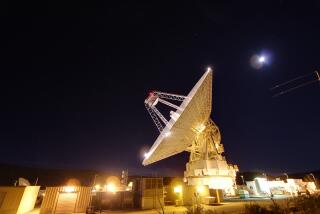NASA Reluctance to Fund Orbiter Told
WASHINGTON — Top officials of the National Aeronautics and Space Administration’s field centers have unanimously recommended that the space agency forgo development of a new space shuttle to replace the Challenger if NASA is forced to take the money from its own budget, informed sources said Friday.
Their view was informally expressed to NASA Administrator James C. Fletcher three weeks ago, the sources said, shortly after White House Chief of Staff Donald T. Regan questioned the need to build a new orbiter at a cost of $2.8 billion to $3 billion.
Three-Shuttle Fleet
According to the NASA officials, who asked not to be identified, the directors of the Kennedy, Johnson and Marshall field centers agreed during a meeting with Fletcher that it would be better to get along with a three-shuttle fleet than to carry out the massive program cuts necessary to finance a replacement shuttle from the NASA budget.
In order to build a new shuttle without a hefty supplemental appropriation, NASA would have to make deep cuts in financially pressed science and astronautics programs, stretch out development of the space station and face shutting down major field centers.
NASA officials said Fletcher believes that an Administration decision requiring NASA to finance a new shuttle from its own budget would be tantamount to a decision not to build one.
$7.5-Billion Budget
For the current fiscal year, that budget is about $7.5 billion and, shortly before the Challenger tragedy, the Reagan Administration requested a budget of $7.6 billion for the year beginning next Oct. 1.
Shortly after the Jan. 28 Challenger accident, President Reagan put the crisis in the hands of an interagency task force under White House National Security Adviser John M. Poindexter.
A final decision on whether to proceed with a Challenger replacement is up to President Reagan, who is expected to make the determination next week while he is visiting his ranch near Santa Barbara, Calif.
Informed sources said that, after weeks of debate, the task force had put together a proposal for funding a new shuttle and developing additional expendable rockets to launch vital payloads but that Regan objected that the panel had not adequately presented a case for building a replacement orbiter.
AF Financing Suggested
One proposal that surfaced in the deliberations was for the Air Force to join in financing a replacement orbiter.
Although the Air Force has supported replacing the lost shuttle, it has resisted joining in financing it, preferring instead to put its resources into a new expendable rocket capable of launching the military payloads that had been scheduled for the shuttle.
Despite the problems of finding an acceptable financing plan and arguments that it would be preferable to invest the money in a more advanced space vehicle, Administration spokesmen have hinted that the President will recommend replacing Challenger.
At his June 11 press conference, Reagan said: “I want to go forward--and I think we all do--with the shuttle program, but how soon we can get to that is a question . . . .” A moment later he added: “Yes, I think we should go forward with another shuttle.”
However, Administration officials denied that the comment was a declaration that the White House would opt to replace Challenger.
Skepticism in Congress
Meanwhile, there have been signs of growing congressional skepticism toward building a new orbiter, although NASA has argued that Challenger must be replaced if the United States is to proceed with the orbiting space station as its next major step in space.
Sen. Jim Sasser (D-Tenn.) last week said that the shuttle launching complex just nearing completion at Vandenberg Air Force Base in California should be mothballed, suggesting at the same time that it is not necessary to build a Challenger replacement.
In Congress, supporters of a new orbiter have been frustrated by the Administration’s long delay in developing a plan for the nation’s space program in the wake of the Challenger disaster. “Outside of the Science and Technology Committee, there is a growing reluctance to move ahead with a fourth orbiter,” Rep. Norman Y. Mineta (D-San Jose) said, “and the longer it is put off, the more difficult it is going to be.”
More to Read
Sign up for Essential California
The most important California stories and recommendations in your inbox every morning.
You may occasionally receive promotional content from the Los Angeles Times.










